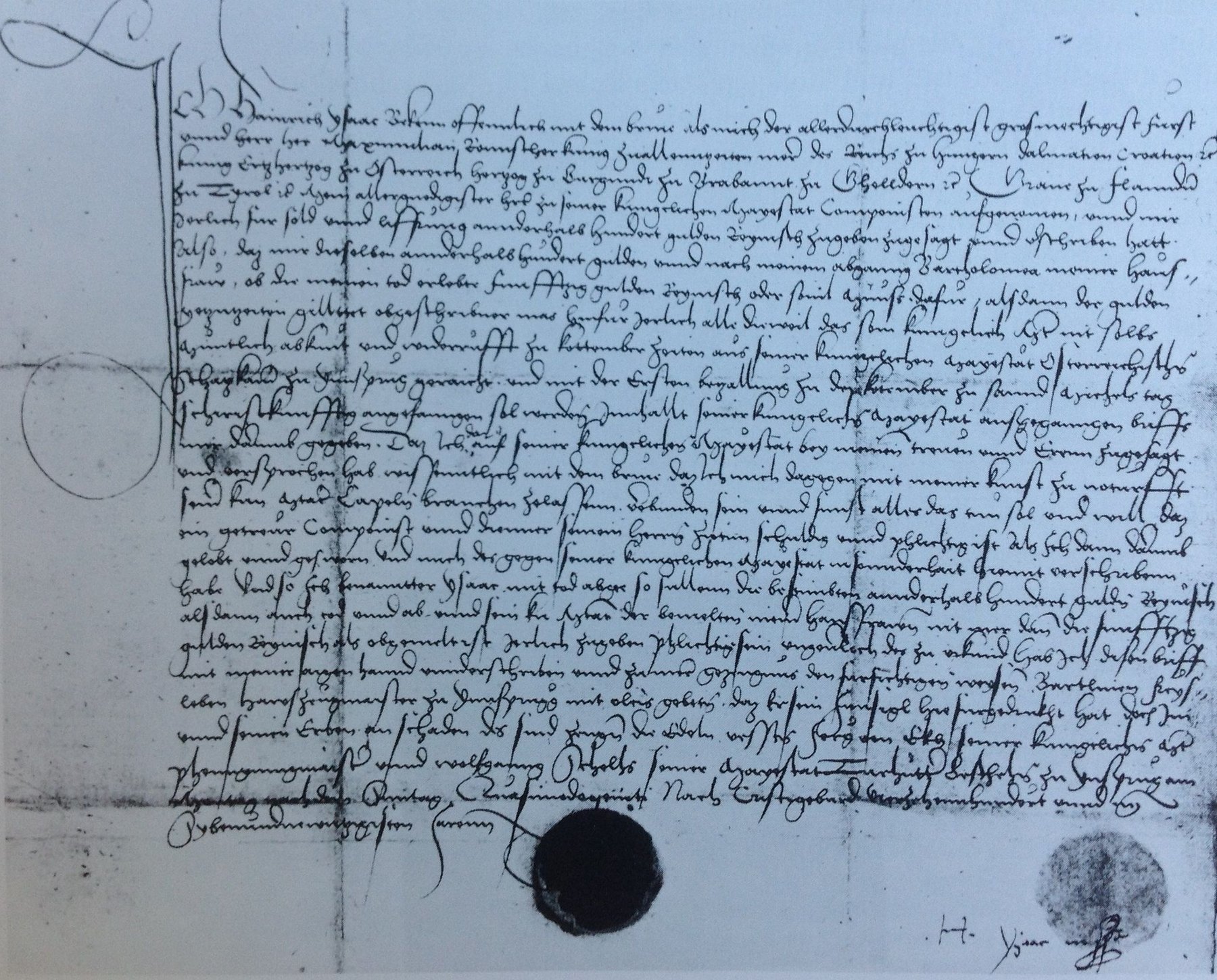“I […] will use all my art for his Majesty’s chapel”
The 1490s saw the most dramatic turn-about conceivable in the Florentine musical scene: Lorenzo il Magnifico’s many years of stable patronage ended with his death in 1492, and by 1494 the Dominican friar Girolamo Savanarola had instituted a religious law under which elaborate liturgical music had no place.[14] Isaac not only lost his job as a singer at the Baptistry of San Giovanni, but found himself in an environment in which his very craft as a producer of musical art-works was viewed with suspicion. It was clear that he would have to leave Florence until a more tolerant regime returned.
A composer with Isaac’s credentials would not remain unemployed for long. In 1496 he took up a position at the Imperial court of Maximilian I, and left Florence for Vienna. With Isaac’s appointment, Maximilian hoped to elevate his court’s musical standards to a level unrivalled anywhere in Europe. To achieve this, Maximilian took Isaac into his service not as a singer, but as componist—court composer—and, in so doing, Isaac became the first musician known to have been employed exclusively to produce musical works.[15] Maximilian promised Isaac a reasonable salary and a pension for his wife, should she outlive him, and in return, Isaac promised to “use all his art” for Maximilian’s chapel, and to serve as a “true composer” (» Abb. Isaac’s contract).[16]
[15] Wegman 1996, esp. 461–469; Wegman 2011.
[16] Full document quoted in Staehelin 1977, vol. 2, 46 f.
[1] Blackburn 1996, 21.
[2] Staehelin 1977, vol. 2, 19; Picker 1991, 4; Senn 1954, 10.
[3] More recent research confirms the date of c. 1476 originally proposed by Thomas Noblitt for the three motets, see » K. 7 The Codex of Nicolaus Leopold. » D-Mbs Mus. ms. 3154 is viewable online at: http://daten.digitale-sammlungen.de/~db/0005/bsb00059604/images/; Isaac’s motets are on fol. 72v, fol. 73v, and fol. 74v. Modern edition: Noblitt 1987–1996. On dating, see Rifkin 2003, 294–307. On possible identities of the scribes, see Strohm 1993, 519 ff. (though doubted in Rifkin 2003, 285 n. 103). See also » F. Regionalität und Transfer.
[4] See, further, Strohm 1993, 526; Kempson 1998, esp. vol. 1, 29–35, 92–106; Strohm/Kempson 2001.
[5] Cumming 2011, with reconstructed score at 268–274.
[6] Relevant documents in Staehelin 1977, vol. 2, after D’Accone 1961 and D’Accone 1963.
[7] Complete text given in McGee 1983.
[9] Modern edition of » D-LEu Ms. 1494: Gerber et al. 1956–1975.
[11] The authenticity of Comme femme has been disputed by some, but is accepted in Fallows 2001.
[13] See also Staehelin 1977, vol. 3, 81–86.
[15] Wegman 1996, esp. 461–469; Wegman 2011.
[16] Full document quoted in Staehelin 1977, vol. 2, 46 f.
[19] See further Burn/Gasch 2011; Strohm 2011.
[20] Especially the Trent Codices and the St. Emmeram Codex (» D-Mbs Clm 14274); Strohm 2011, 42 ff. and the literature cited there.
[21] It is difficult to specify how many feasts Isaac’s surviving mass propers could cover, given the multiple use of the common of saints, and the uncertaintly around the details of the liturgies for which Isaac composed. An estimate of around 150 days in the year seems reasonable.
[24] Glarean 1547, 460; trans. in Picker 1991, 17 f.
[25] It is generally agreed that the first and third volumes contain imperial music, and the second music for Konstanz; see Burn 2003. Rothenberg 2011a presents an alternative hypothesis.
[26] Among others, the monastery of St. Ulrich and Afra in Augsburg, and the monasteries of Neresheim and Ottobeuren; see especially Eichner 2011 and Rimek 2011.
[28] Digitised images of the manuscript, including the two autographs, are available at: http://resolver.staatsbibliothek-berlin.de/SBB00012DA900000000. The “de manu sua” pieces are at fols. 8 ff., fol. 255v–256v, and fol. 294.
[29] Owens 1997, 258–290.
[30] The earliest mass “contra Turcos” is traceable to 1453/54; Jensen 2007, 117.
[31] The letter in which Du Fay mentions his laments is reproduced in Fallows 1982; Kirkman 2010, 121 f.
[32] Concordances to » D-B Mus. ms. 40021 (c. 1498–1500): D-Mu, 8°Cod. ms. 328-331 (Lalla hoe hoe; 1520s); » A-Wn Mus.Hs.18810 (La la hö hö; 1524–1533). D-B preserves the work in a longer form than the concordances, with a central section absent elsewhere. The longer form is most likely the original; transcriptions of the longer version in Staehelin/Neubauer 1991, and Just 1990/1991, vol. 3. For digitised images of D-Mu, 8°Cod. ms. 328-331 see: http://epub.ub.uni-muenchen.de/view/cim/cim.html; for D-B Mus. ms. 40021 (the piece is at fol. 224v; piece No. 110): http://resolver.staatsbibliothek-berlin.de/SBB00012DA900000000.
[33] Somewhat similar is Isaac’s “motet on a fantasia called La mi la sol”, which he composed for a job-interview in Ferrara in 1502, though the basic material of La la hö hö is even more striking in its limitations, and not connected to the piece’s title through solmisation-syllables.
[35] Wiesflecker 1971–1986, passim.
[36] Wiesflecker 1971–1986, vol. 2, 156; also Staehelin/Neubauer 1991, 38 n. 24.
[37] Lindmayr-Brandl 1997, 255; Staehelin 1989 proposes that the original first word was not “Innsbruck” but “Zurück”.
[38] Strohm argues that he did in Strohm/Kempson 2001.
[39] Strohm 2014, 7.
[40] RISM 1539/27. This source is also now viewable online, at: http://daten.digitale-sammlungen.de/~db/0007/bsb00074418/images/?viewmode=1.
[41] Salmen 1997, 250.
[42] First in Ernst Ludwig Gerber’s Neues historisch-biographisches Lexikon der Tonkünstler (Leipzig 1812–1814); see Lindmayr-Brandl 1997, 258.
[43] Drexel 1997, 285.
[45] Staehelin 1977, vol. 2, 89–130; Burn 2006.
[46] Strohm, in Strohm/Kempson 2001. On Isaac’s pupils, see Picker 1991, 15 f. On Senfl, see » G. Ludwig Senfl.
[48] Bente 1968; with important revisions in Lodes 2006. Most of the books are viewable at: http://daten.digitale-sammlungen.de/~db/ausgaben/uni_ausgabe.html?projekt=1257941718&recherche=ja&ordnung=sig.
[49] D-Mbs Mus. ms. 35–38, all consultable online at: http://daten.digitale-sammlungen.de/~db/ausgaben/uni_ausgabe.html?projekt=1257941718&recherche=ja&ordnung=sig.
[50] Glarean 1547, 261; cited in Picker 1991, 15.
